
| Publisher: | Random House | |
| Genre: | Short Stories (single author), Literary, Fiction, Asian American & Pacific Islander | |
| ISBN: | 9780812998993 | |
| Pub Date: | July 2025 | |
| Price: | $28 |
| Starred | Fiction |
by Ed Park
Ed Park (Same Bed Different Dreams) writes books that are easy to love and hard to define. His writing is hilarious but also serious; chaotic while still cohesive; irreverent and earnest all at once. The short stories in An Oral History of Atlantis are not linked, not exactly, but characters do recur, and the whole thing hangs together like an ensemble cut from the same cloth. Though the stories span decades, they maintain an odd kind of continuity, making the collection highly satisfying.
Park maintains a deadpan delivery even in the most absurd of situations. The opening story, "A Note to My Translator," introduces author Hans de Krap, who is deeply concerned about the translation work in progress: "Page nine: Solomon Eveready reappears, this time smoking cut-grade reefer and imitating a trout. Explain this."
Not every story is so openly funny, but they all create an unexpected alchemy of droll humor, detached irony, and serious reflection. Take, for instance, the narrator of "Bring on the Dancing Horses," who lives with Tabby: "Tabby is a brilliant genius in her own way, but sometimes I worry that she is turning into an alien." Despite the hilarity of their interactions, a sad feeling is embedded in brief asides about his family. When his dad e-mails and the narrator suggests they chat online, his father ignores the invitation while continuing to post on Facebook. He asks, "Doesn't he know I can see them? Doesn't he know I'm his friend?" This sense of longing for something just out of reach is the thread that binds Park's stories--to each other and to the reader. --Sara Beth West, freelance reviewer and librarian
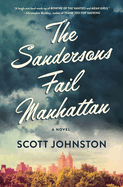
| Publisher: | St. Martin's Press | |
| Genre: | Family Life, General, City Life, Fiction | |
| ISBN: | 9781250384782 | |
| Pub Date: | July 2025 | |
| Price: | $29 |
| Starred | Fiction |
by Scott Johnston
Scott Johnston's The Sandersons Fail Manhattan is a satirical novel designed to capture its social, political, and cultural moment. And once that moment has passed, the novel will retain its zing on the strength of its plotting and humor.
William Sanderson, a parent at Manhattan's Lenox Hill School for Girls, is attending his first board meeting when the head of school announces that, in response to Lenox's diversity efforts, it's welcoming a transfer student who "self-identifies as goblincore, a growing subculture inspired by the folklore of goblins." William, a financier, can't muster much enthusiasm for this news; what he wants from the school more than diversity is its help getting his elder daughter, a Lenox senior, into Yale, his alma mater. How will the "eco-sexual" transfer student fare at Lenox? And how will William take it when he learns that moneyed, white-dominant private schools like Lenox have fallen out of favor with college-admissions officers?
The Sandersons Fail Manhattan is a wicked spoof of modern mores ("The dining tables at Lenox were all round, someone having decided that rectangular tables resulted in power imbalances"). Johnston (Campusland), like Paul Rudnick with his novel What Is Wrong with You?, is an equal-opportunity skewerer: he sticks it to everyone (WASPs, virtue signalers, social climbers) and everything (elite schools, the college-admissions racket, conscientious capitalism) without drifting into mean-spiritedness (a transgender student's plight is handled with terrific sensitivity). As the novel's perspective wanders from character to character, it's clear that Johnston's main beef is with cowardice--a politically neutral identifier. --Nell Beram, author and freelance writer
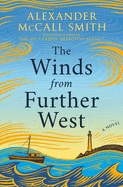
| Publisher: | Pantheon | |
| Genre: | Clean & Wholesome, Animals, Romance, Literary, Fiction | |
| ISBN: | 9780385551410 | |
| Pub Date: | July 2025 | |
| Price: | $28 |
| Fiction |
by Alexander McCall Smith
Alexander McCall Smith's The Winds from Further West is a hopeful, philosophical story of new beginnings. Dr. Neil Anderson is mostly content with his public health research position in Edinburgh, Scotland. He enjoys lecturing, he is dating a fellow academic named Chrissie, and his life flows gently along.
But when a brash male student accuses him of saying something denigrating in lectures, Neil refuses to apologize, believing he has done nothing wrong. The head of the research institute suspends him and Neil heads home from work early, only to discover Chrissie having an affair with her interior design tutor.
Neil clearly needs a fresh start, and he leaves Edinburgh to stay in his friend James's holiday cottage on the Isle of Mull. As a local soon remarks to Neil, there's "nothing like a remote spot to put things into perspective," and Neil begins to recuperate from "the zeitgeist... of suspicion and hostility."
McCall Smith (Trains and Lovers; The No. 1 Ladies' Detective Agency) describes Mull with love--especially the locals who live on island time and enjoy the wide-open skies and seas. Readers will be drawn to his evocative prose as Neil analyzes the loss of his job and the demise of his relationship and discusses the topics with the farmers and fisherfolk around him. Poetic and slowly paced despite all that happens to Neil, The Winds from Further West is a nod to the kind of community that develops when people trust one another other, rather than othering the unknown. --Jessica Howard, former bookseller, freelance book reviewer

| Publisher: | Putnam | |
| Genre: | Family Life, Humorous, General, Literary, Fiction | |
| ISBN: | 9798217045433 | |
| Pub Date: | July 2025 | |
| Price: | $29 |
| Fiction |
by Sonoko Machida, trans. by Bruno Navasky
Sonoko Machida's welcoming The Convenience Store by the Sea joins recent J-healing bestsellers nurturing community and celebrating kindness. In Mojikō's Retro District, famous for "adorable retro buildings by the glittering sea," is the titular convenience store, the "top sales ranking" branch of the Tenderness chain, promising "Caring for People, Caring for You." Its location on the ground level of Golden Villa Apartments means regular customers, particularly among the senior citizens who populate floors three through eight.
Undeniably, the store's success is also directly linked to its manager, Shiba, his model good looks surpassed only by an irresistible charisma. He's even managed to inspire Mitsuri, one of his loyal staff, to fulfill her lifelong dream of becoming a manga artist with the creation of her popular online series, The Phero-Manager's Indecent Diary (ongoing, with Shiba's permission). Among their regulars are acerbic Urata, whose sharpness belies deep, insightful caring; cram-school teacher Kiriyama, whose drawing finally gets the audience it deserves; teen Azusa, who finds genuine friendship over Tuesday night sweets; a recent retiree who relearns the meaning of family; and a love-wary young man navigating his first thwarted crush. Floating through all their lives is everyone's favorite, "Whatever Guy," with his uncanny ability to locate anyone at any time.
In Machida's English-language debut, charmingly translated by Bruno Navasky, she writes encouragingly of unexpected connections that foster new growth and fulfillment. Come in seeking easy gratification, leave with a promise of soulful nourishment, she seems to say. Deftly decorated with sly humor and the slightest hint of fabulism, The Convenience Store by the Sea is a thoroughly inviting, sigh-inducingly satisfying read. --Terry Hong

| Publisher: | Melville House | |
| Genre: | Ireland - 21st Century, World Literature, Coming of Age, Lesbian, Fiction, LGBTQ+ | |
| ISBN: | 9781685892111 | |
| Pub Date: | July 2025 | |
| Price: | $19.99 |
| Fiction |
by Chloe Michelle Howarth
Sunburn is a dreamy, sapphic bildungsroman that will suck readers in with its lush, atmospheric prose and fraught relationships. Chloe Michelle Howarth's debut novel follows Lucy, a teenager living in rural Ireland in the 1990s and the forbidden feelings that develop between her and Susannah, who's in her inner circle of friends.
Lucy lives in a traditional Catholic family, doesn't think much of herself, and seems compelled to seek approval from her community, especially her mother. Susannah is a golden-haired spitfire growing up in a divorced, liberal family. Her mother comes and goes and struggles with her own problems after being left with only the trappings of wealth but no actual money following the departure of her husband.
Susannah rebels for attention from her preoccupied mother and wants to come out in part to shock her, while Lucy is desperate to hide her sexuality from her own mother. This perfect storm of cultural and interpersonal conflicts lends momentum to the novel's gorgeous prose. The text sings on the subject of romance, with lyrical descriptions: "Already her fingerprints have disappeared from my collar, gone fast, like smears of the day moon."
Howarth perfectly captures the intensity and nostalgia of adolescent emotions, the overwhelming internal drama of a time when everything feels like "mine are real problems, nobody else's." But Sunburn's conflicts are real, including deep-rooted problems of a country just beginning to grapple with questions of who is allowed to love whom and the inexorable consequences for those who grew up being told that their very identity was a sin. --Carol Caley, writer

| Publisher: | Alcove Press | |
| Genre: | Renaissance, Women, Fiction, Historical | |
| ISBN: | 9798892422529 | |
| Pub Date: | July 2025 | |
| Price: | $19.99 |
| Fiction |
by D.J. Nix
D.J. Nix's entertaining debut novel, The Shakespeare Secret, explores the possibility that Shakespeare was a woman--or, in this case, three women who jointly write several groundbreaking plays and hire an actor to publish them as his own.
On the surface, court musician Emilia Bassano has little in common with Mary Herbert, poet and Countess of Pembroke, and barely literate seamstress Jane Daggett. But all three women share a passion for stories and a distaste for the hackneyed plays often presented at court. Meeting regularly to write in secret, the women draft the play that will become The Taming of the Shrew and hire Will Shakespeare, an actor and acquaintance of Jane's, to claim authorship of the play and get it onto the stage.
Nix's narrative shifts among the three women's perspectives, providing details of women's lives, court intrigue, and theatrical productions in Elizabethan England (plus a few gruesome plague scenes). The queen herself makes several key appearances, as do her spymaster Robert Cecil and other courtiers real and fictional. When one of Cecil's men spies on the women and becomes convinced they are plotting to kill Queen Elizabeth, they must keep their wits about them to refute the rumor, even as they race to finish their latest play. Their eventual triumph, though partially anonymous, is still quite satisfying.
Compelling, witty, and sprinkled with lines from the Bard of Avon's work and sharp social commentary, The Shakespeare Secret is an enjoyable historical what-if for Anglophiles and Shakespeare lovers. --Katie Noah Gibson, blogger at Cakes, Tea and Dreams
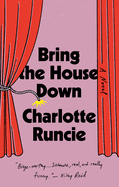
| Publisher: | Doubleday | |
| Genre: | Feminist, Humorous, General, Literary, Fiction | |
| ISBN: | 9780385551076 | |
| Pub Date: | July 2025 | |
| Price: | $28 |
| Fiction |
by Charlotte Runcie
Charlotte Runcie's complex and layered debut novel, Bring the House Down, takes place over four weeks at the Edinburgh Fringe Festival. Runcie addresses themes of parenthood, celebrity, family, and sincerity, in addition to the gendered relationship between performer and critic.
The narrator is Sophie Rigden, junior culture writer at the national newspaper where Alex Lyons, "nepo baby" son of a great actress, is chief theater critic. In the festival's first week, Alex writes a scathing review of Hayley Sinclair's show and goes out for a drink. He recognizes Hayley at the bar and acts on their mutual attraction without telling her who he is. The next morning, at the paper's Edinburgh flat that Sophie is sharing with Alex, Hayley reads Alex's terrible review and storms out. Over the next few weeks, Hayley transforms her show and gains international attention as she invites women to join her on stage or send in their stories about Alex similarly wronging them, in a #MeToo-style reckoning. Sophie watches Alex spiral, thinks about how his childhood affected him and how she came to her beliefs about men, and grapples with confusing thoughts about ethics and accountability.
Though Runcie places the book's events in 2005, she sensitively captures the conflicting thoughts and feelings characterizing discourse in the post-#MeToo world through Sophie's observation and eventual action. With characters who are all "flawed and perfect and beautiful," Bring the House Down will leave readers in a state of catharsis and contemplative reflection. --Dainy Bernstein, freelance reviewer
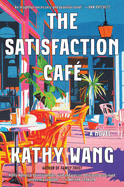
| Publisher: | Scribner | |
| Genre: | Family Life, Literary, Marriage & Divorce, Fiction, Asian American & Pacific Islander | |
| ISBN: | 9781668068922 | |
| Pub Date: | July 2025 | |
| Price: | $28.99 |
| Fiction |
by Kathy Wang
Kathy Wang's poignant, charming third novel, The Satisfaction Café, follows the unpredictable decades of a Taiwan immigrant's California life. In 1975, 25-year-old Joan Liang is two years into her Stanford master's program. "For her entire life thus far, Joan [has] been a very good girl," but six weeks into her marriage, she (non-fatally) stabs her husband--because he deserves it.
Single again, she meets 51-year-old Bill--white, wealthy, thrice-divorced, with twins just a year younger than Joan. Lawyers and financial advisers get involved, but Joan and Bill's contented (enough) union lasts, producing two more children, Jamie by birth, Lee by adoption (she's Bill's sister's daughter). When Bill dies, his eldest son, Theo, sets the family's iconic mansion ablaze after learning he didn't inherit it. Rather than rebuilding, Joan eventually opens the Satisfaction Café. Inspired by a chance encounter with a professional Tokyo hostess, her "special" café is "a place one visited for conversation." And the customers come.
Wang (Family Trust) places Joan center stage, but she's equally attentive to the supporting cast, creating diverse, memorably quirky characters: Joan's acerbic mother; Jamie and his problematic "desire to please"; reliable lawyer Nelson; Jamie's colleague Ellison, who becomes Joan's employee. Wang writes with an easiness, never wallowing despite a lingering loneliness. She slyly addresses issues of racism and inequity with sharp wit: Jamie warns Joan to "behave" and not "do that thing you sometimes do... when you answer questions bluntly and pretend you don't know it's rude because English isn't your first language." For lucky readers, Wang expertly, gratifyingly nurtures that incisive directness throughout. --Terry Hong
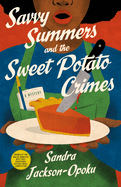
| Publisher: | Minotaur | |
| Genre: | Mystery & Detective, Cozy - Culinary, African American & Black, Fiction, Women Sleuths | |
| ISBN: | 9781250351906 | |
| Pub Date: | July 2025 | |
| Price: | $28 |
| Starred | Mystery & Thriller |
by Sandra Jackson-Opoku
A popular soul food eatery on the South Side of Chicago is the scene of a possible homicide in Sandra Jackson-Opoku's action-packed mystery, Savvy Summers and the Sweet Potato Crimes. The unforgettable narrator and cafe owner, Sapphire "Savvy" Summers, is a former English teacher with a knack for whipping up delectable dishes, including her famous sweet potato pie.
Jackson-Opoku (The River Where Blood Is Born), a Chicago native, is an award-winning poet and writer. She has created in Savvy a charismatic woman who has survived a myriad of losses and is determined to be the author of her own story. Savvy's lively narration often veers into a Black vernacular and she liberally quotes her beloved late great-aunt Essie's wise proverbs. Savvy's cafe is a cheerful gathering spot for an assortment of locals and is a flourishing enterprise until the unfortunate day that a customer, Grandy Jaspers, drops dead at his regular table. The cause of death is a heart attack precipitated by an overdose of Viagra, but all anyone remembers is that the deceased sampled Savvy's new vegan sweet potato pie before keeling over.
Convinced that the death is no accident and eager to redeem her new signature dessert, Savvy and her nosy sous-chef, Penny, set out to do some amateur detective work. Savvy's handsome ex-husband, Fanon Franklin, is a police officer who still carries a torch for her and his presence adds a charming dash of romance to the action.
Savvy Summers and the Sweet Potato Crimes is an entertaining, suspense-fueled crime drama with a bonus chapter featuring recipes, including Savvy's infamous and subsequently prize-winning vegan sweet potato pie. --Shahina Piyarali
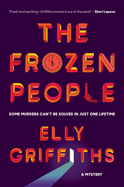
| Publisher: | Pamela Dorman Books | |
| Genre: | Mystery & Detective, Fantasy, Romance, Time Travel, Fiction, Historical | |
| ISBN: | 9780593834374 | |
| Pub Date: | July 2025 | |
| Price: | $30 |
| Mystery & Thriller |
by Elly Griffiths
Edgar Award-winner Elly Griffiths's beguiling The Frozen People turns on a captivating dilemma. Fifty-year-old Alison Dawson is a time-traveling cold-case detective in 2023 London with a 30-year-old son, Finn, and three ex-husbands. Alison's government-supported Department of Logistics sends agents back in time to resolve cases "so cold they are frozen"; Finn is special adviser to Tory member of Parliament Isaac Templeton. Mother's and son's work paths cross when self-aggrandizing Templeton, writing a book about his great-great-grandfather, Cain, wants to exonerate him of the murders of three women. The catch: the supposed crimes occurred in the 1850s, and no one in Alison's department has ever traveled back that far.
The clever hook: team members enter past realms through a portal called "the gate." They arrive at a specific spot, mark it with invisible ink, and return to that ingress point to exit. Alison prepares for her Victorian adventure with knee-length bloomers, whalebone corset, and a poke bonnet. What she doesn't prepare for is to be stranded in the January "mini-ice age" blizzard. Expecting to stay an hour in 1850, Alison is trapped for days.
Complications ensue in Alison's home zone when Finn is accused of murder. Griffiths seamlessly shuffles overlapping clues that might solve murders in both time periods. When a dastardly 19th-century culprit uses Alison's portal, he may be loose committing 21st-century crimes. Thrills mount as readers follow the team's amazing race against time. The totally unexpected and head-spinning solution makes for an engagingly impressive whendunit. --Robert Allen Papinchak, freelance book critic
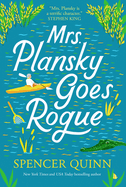
| Publisher: | Forge | |
| Genre: | Family Life, Mystery & Detective, General, Fiction, Women Sleuths | |
| ISBN: | 9781250331830 | |
| Pub Date: | July 2025 | |
| Price: | $28.99 |
| Mystery & Thriller |
by Spencer Quinn
At 71, Loretta Plansky enjoys leisurely days of tennis and cocktails in her Little Pine Lake, Fla., condominium community. But after rescuing her retirement funds and bringing Romanian scammers to justice, she seems to have unleashed a knack for adventurous crime solving. Spencer Quinn (Of Mutts and Men; Paw and Order), author of dozens of novels, follows Mrs. Plansky's Revenge with Mrs. Plansky Goes Rogue, the second delightful whodunit featuring the inimitable septuagenarian sherlock.
Quinn, who also writes the Chet and Bernie mystery series, relates this fast-paced, dialogue-rich caper from the third person, which includes Loretta's sentimental memories of her beloved late husband and regular references to her age. "That rang a bell but for no reason she could think of. Was that happening more and more these days, bells ringing, their sound waves flowing through her mind, finding no harbor, silence?" Don't be fooled by her reflections. Mrs. Plansky is a woman on a mission. Her tennis-pro son is incommunicado, and Mrs. Plansky is sure her now-missing tennis partner's yacht explosion wasn't caused by lightning. Her 98-year-old father suggests a link between the men (though he's distracted by his impending splashy wedding), and Mrs. Plansky daringly investigates. Seeking clues, she scuba dives to the sunken yacht site, takes an ill-fated flight to the Bahamas, kayaks in an infamous gator's favorite lake, and fearlessly grills unsavory characters. With over-the-top close calls providing suspense and laughs in equal measure, this savvy and sympathetic sleuth's exploits guarantee a rollicking read. --Cheryl McKeon, Book House of Stuyvesant Plaza, Albany, N.Y.
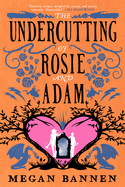
| Publisher: | Orbit | |
| Genre: | Fantasy, Romance, Fiction | |
| ISBN: | 9780316568272 | |
| Pub Date: | July 2025 | |
| Price: | $19.99 |
| Science Fiction & Fantasy |
by Megan Bannen
Megan Bannen's fantasy romance trilogy rides off into the sunset with its funny, sexy, and bittersweet final installment, The Undercutting of Adam and Rosie.
Demigod Rosie Fox has a case of immortality burnout. Her job as a Tanrian Marshal doesn't have the same shine after more than a century and a half of life, loss, and surviving her own deaths. "She was stuck--just stuck--and she had no way to unstick herself." Then she sees a strange shadow in one of the portals between the wilds of Tanria, a magical area built to contain gods, and the surrounding country of Bushong. She pokes the shadow and fries the portal's circuits, electrocuting herself to death in the process and causing the authorities to summon Dr. Adam Lee, the portals' inventor. Rosie is ordered to serve as Adam's escort, and more portal breakdowns trap them in Tanria together. Brash, filter-free Rosie finds "dauntingly crisp," tightly controlled Adam a puzzle in immaculately cut menswear. She slowly learns that his past might be even weirder than her own, and the two of them could get themselves unstuck for good.
Bannen (The Undermining of Twyla and Frank; The Undertaking of Hart and Mercy) sells the idea of immortality as curse instead of blessing admirably well. She also finds a fitting ending for both Rosie and the overall series' narrative arc. Rosie is a bighearted, big-framed, big-mouthed heroine to love and cheer for, and her interplay with repressed, proper Adam is hot and hilarious. Series fans and newcomers alike will enjoy this adventurous, creative romance. --Jaclyn Fulwood, blogger at Infinite Reads
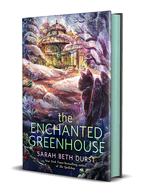
| Publisher: | Bramble | |
| Genre: | Romantic Comedy, Fantasy, Romance, Fiction | |
| ISBN: | 9781250333988 | |
| Pub Date: | July 2025 | |
| Price: | $29.99 |
| Science Fiction & Fantasy |
by Sarah Beth Durst
Fans of cozy fantasy can make their jubilant return to the whimsical, comforting world of Sarah Beth Durst's The Spellshop via its romantic, joyful companion novel, The Enchanted Greenhouse.
Terlu breaks a law against common folk practicing magic and gives a spider plant sentience so she can have a friend at her lonely job at the Great Library of Alyssium. A judge sentences her to be transformed into a wooden statue as punishment. Six years later, she awakens in living form on an island housing a vast network of greenhouses that are inhabited by a winged cat, room after room of enchanted flora, and Yarrow, a handsome, grouchy gardener who looks at Terlu "as if she were a wish he'd been granted." The greenhouse collective is a magical wonderland, but after the death of its creator, it is failing. Yarrow's call for help got him Terlu and a spell to free her, which mystifies her, since he clearly needs a sorcerer. Terlu, who falls for Yarrow, becomes determined to save his home and its inhabitants even if it means breaking the law all over again.
Durst fills her setting with trappings fantastical and adorable. Watching as lonely Terlu finds the companionship she needs and works out the mystery of the greenhouses' failure will delight readers looking for both character growth and fantasy elements. Familiarity with the series isn't necessary to enjoy this stand-alone installment, but readers of The Spellshop who remember Terlu as a statue may find extra satisfaction in her story. --Jaclyn Fulwood, blogger at Infinite Reads
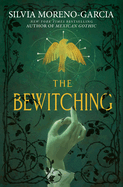
| Publisher: | Del Rey | |
| Genre: | Occult & Supernatural, Horror, Dark Fantasy, Fantasy, Gothic, Paranormal, Fiction | |
| ISBN: | 9780593874325 | |
| Pub Date: | July 2025 | |
| Price: | $29 |
| Science Fiction & Fantasy |
by Silvia Moreno-Garcia
Three women in different eras battle dark and mysterious forces in The Bewitching, an eerie gothic thriller from Silvia Moreno-Garcia (Silver Nitrate; Mexican Gothic).
Minerva worries that she has already plateaued in grad school. She plans for her thesis to shine a spotlight on Beatrice Tremblay, author of "Weird fiction," by examining the claim that her novel The Vanishing was based on a true story and analyzing it in the context of New England folklore. When a chance encounter gives Minerva the opportunity to study Tremblay's personal diary, she begins to suspect that the same malign force that haunted Tremblay and her fascinating roommate, who disappeared under mysterious circumstances, still lurks at Stoneridge College. And it may be the same sort of witchcraft Minerva's great-grandmother Nana Alba spoke of in tales of her youth in Mexico.
Moreno-Garcia combines dark academia and folklore in a multigenerational narrative in which class privilege, on campus and in the Mexican countryside, is as palpable a menace as magic. Her characters are compelling young women with desires--for love, status, or knowledge--that radiate from the page. In the world of The Bewitching, magic is only as evil or good as the person wielding it, and those who use it for evil are as sinister and seductive as any reader of gothic novels could want. The determination of the three heroines to harness whatever power necessary to will hold readers in suspense. Fans of V.E. Schwab and H.G. Parry will find much to appreciate. --Kristen Allen-Vogel, information services librarian at Dayton Metro Library
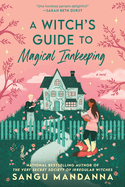
| Publisher: | Berkley | |
| Genre: | Occult & Supernatural, Fantasy, Romance, Contemporary, Cozy, Fiction, Paranormal - Witches | |
| ISBN: | 9780593439371 | |
| Pub Date: | July 2025 | |
| Price: | $19 |
| Romance |
by Sangu Mandanna
Sangu Mandanna's utterly charming second novel for adults, A Witch's Guide to Magical Innkeeping, follows a young witch trying to reclaim her magic as she manages a creaky, cozy inn and cares for its wacky, endearing guests.
As a child, Sera Swan caught the eye of the British Guild of Sorcery and its powerful chancellor. But when she raised her beloved great-aunt from the dead, Sera lost her position in the guild and most of her magic. Fifteen years later, she's mostly content keeping her family's inn running via elbow grease and her scant remaining magic when she's offered a chance to get her powers back by way of an ancient spell. Luke Larsen, a gruff but brilliant magical historian, arrives to grudgingly help Sera in this quest, aided by a hapless knight, an undead rooster, and a witch who accidentally turned herself into a fox.
Mandanna (The Very Secret Society of Irregular Witches) concocts a sweet love story not only between Luke and Sera but also among the inn's motley crew of inhabitants, who form a delightful and accepting found family. The household stands by Sera as she works to restore her magic and keep the inn, and her heart, from falling completely to pieces. Though she yearns to have her full powers restored, Sera comes to appreciate the true, if unpredictable, magic in the oddball life she's built and the strength of the person she's worked to become. Readers will savor the quirky enchantment (spell-related and otherwise) of the warm, whimsical world Mandanna has created. --Katie Noah Gibson, blogger at Cakes, Tea and Dreams
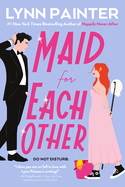
| Publisher: | Berkley | |
| Genre: | Women, Romantic Comedy, Romance, Fiction | |
| ISBN: | 9780593638033 | |
| Pub Date: | July 2025 | |
| Price: | $19 |
| Romance |
by Lynn Painter
Lynn Painter (The Love Wager; Mr. Wrong Number) expertly combines heartfelt romance and charming comedy in Maid for Each Other. Abi Mariano is down on her luck. She's a part-time student juggling loans and two jobs when an infestation in her apartment building leaves her with nowhere to go--until she realizes the penthouse she cleans is vacant and nobody will be the wiser if she spends a couple nights there. She's proved wrong when she wakes up to two strangers in the kitchen, eating the muffins she baked the night before, who are not at all surprised to see her there.
Declan Powell, an executive at the country's biggest furniture store, always puts work first. That's why he created a fake girlfriend. When his parents claim to have met "Abby," who is definitely notreal, he doesn't know how to react. Eventually, he formulates the perfect plan. The weekend's big work event will be the ideal place to showcase Abi (the real one) and finally prove to his bosses that he is the "family man" they want him to be.
Abi's razor-sharp humor is a perfect foil for Dex's serious demeanor. Fancy parties, family 5Ks, and private plane send-offs provide entertaining settings for fun, flirting, and thrilling looks inside the life of a millionaire. But at the end of the day, the glitz and glamour fade, and genuine, endearing moments highlight Abi's true feelings and Dex's soft side. What began as pure fiction becomes an unmistakably authentic love story. --Clara Newton, freelance reviewer

| Publisher: | Berkley | |
| Genre: | Romantic Comedy, Romance, Fiction | |
| ISBN: | 9780593816356 | |
| Pub Date: | July 2025 | |
| Price: | $19 |
| Romance |
by Alexa Martin
With How to Sell a Romance, Alexa Martin (Better than Fiction; Next-Door Nemesis) has created a sexy and hilarious romance starring a kindergarten teacher caught up in a multilevel marketing scheme. Emerson Pierce loves teaching, but it doesn't pay all her bills, so when her principal invites her to a Petunia Lemon event with a promise that the company's skin care line could earn Emerson thousands of dollars as a "girl boss," Emerson signs up.
Emerson meets an extremely handsome man, Luke, at the event's rooftop bar and spends the night with him. In the morning, Emerson reveals that she's a new Petunia Lemon rep once Luke mentions that he's an investigative journalist working on an exposé of the company. The situation worsens when the new school year begins and Emerson is appalled to discover that "Luke" is Lucas Miller, the father of one of her students. As Emerson realizes that Lucas is a really kind person and a good father and that she's actually losing money on her side gig, she wonders whether the attractive reporter might have been right about Petunia Lemon after all.
Clever and laugh-out-loud funny, How to Sell a Romance will appeal to anyone fascinated by multilevel marketing scandals and the failures of "girl boss" culture. Martin nails the pyramid selling vibes and school parent-teacher dramas. Martin mixes in essential elements--with her knack for description and some steamy scenes between Emerson and Lucas--to create a great romance novel. --Jessica Howard, former bookseller, freelance book reviewer
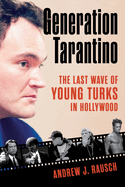
| Publisher: | Bloomsbury Academic | |
| Genre: | History & Criticism, Film, Performing Arts | |
| ISBN: | 9781493079803 | |
| Pub Date: | July 2025 | |
| Price: | $34.95 |
| Performing Arts |
by Andrew J. Rausch
The 1990s were a boffo decade for newly minted directors: Richard Linklater released Slacker (1990), Quentin Tarantino released Reservoir Dogs (1992), and so on. In Generation Tarantino: The Last Wave of Young Turks in Hollywood, Andrew J. Rausch (The Films of Martin Scorsese and Robert De Niro) lays out with undisguised exuberance how "the attitude and swagger that has come to define Gen X" reverberates through this distinguished crop of movies.
Rausch devotes chapters to each of 13 filmmakers (some of whom he interviewed for this project) whose feature debuts, which were released or made in the 1990s, launched long careers; he explores each director's output in the 1990s in terms of financing, casting, visual approach, and more. The characters in these films don't sound like professors, and neither does Rausch. Writing conversationally ("Here's the deal"), he's free with his opinions while also quoting generously from critics with not-always-corroborating views on the work under discussion.
The featured filmmakers largely came of age in the tumultuous 1970s, and many had the gumption to skip film school and go the DIY route with funding--commonalities that Rausch believes help explain the maverick spirit of their work. Equally interesting to him is each artist's distinctiveness. Unlike Robert Rodriguez (1992's El Mariachi), Sofia Coppola, daughter of director Francis Ford, didn't have to participate in a clinical trial to finance her first feature (1999's The Virgin Suicides), but she may be the only director of her (or any) generation who took her cast to play laser tag. --Nell Beram, author and freelance writer

| Publisher: | Convergent Books | |
| Genre: | Self-Help, Political & Protest, American, Literary Criticism, Spiritual, General, Poetry, Subjects & Themes, Motivational & Inspirational | |
| ISBN: | 9780593602171 | |
| Pub Date: | July 2025 | |
| Price: | $18.99 |
| Starred | Poetry |
by David Gate
David Gate takes inspiration from all corners of 21st-century life lived under the extractive systems of late-stage capitalism in the poems and essays of A Rebellion of Care, a moving and necessary collection for any reader feeling the heaviness of current events. Gate is an immigrant and Appalachian homesteader, and questions of belonging sit alongside his observations of the natural world, as in "The Good We Can Imagine," which compares planting a kale seed to "throwing a pebble/ at a panzer tank." Pop-culture references abound, some specific ("Less panic, more disco!/ Less cold, more play/... However/ More joy, less division") and some general (a poem titled "Twerk of Art"). He writes about writing and creativity, faith in the face of weaponized religion, gender roles, love, community, and what it takes to share such small joys when "very little in our world seems right these days."
Gate's commitment to joy is not steeped in toxic positivity or unwitting devotion to finding the good. "I cannot keep practicing wellness in a hellscape," he notes in the collection's introduction. Instead, he invites readers to embrace joy--as rebellion, in one another, in intentional community built "of absolute fucking weirdos," in action--that exists alongside the complexities, violence, and inequities of the world and refuses to give up or give in. "I believe that truth still hums with possibility," Gate writes. "And saying something true in a world awash with lies/ is the first act of rebellion." A Rebellion of Care promises to inspire and inflame, its words a soul-soothing offering of care found in the beauty and vision of community Gate conjures. --Kerry McHugh, freelance writer
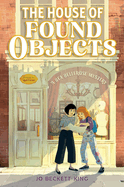
| Publisher: | Simon & Schuster | |
| Genre: | Europe, Mysteries & Detective Stories, Family, Juvenile Fiction, Multigenerational, Places | |
| ISBN: | 9781665967174 | |
| Pub Date: | July 2025 | |
| Price: | $17.99 |
| Starred | Children's & Young Adult |
by Jo Beckett-King
Newly acquainted cousins must solve a cryptic, puzzle-filled scavenger hunt to rescue a family heirloom in the gutsy middle-grade mystery The House of Found Objects by debut author Jo Beckett-King.
Twelve-year-old American Bea Bellerose is staying with her Aunt Juliette in Paris while her parents are away at a conference. Unfortunately, Aunt Juliette is working a lot more than planned and Bea is spending most of her time alone in the apartment or downstairs in her grandmother's antiques shop, La maison des objets trouvés. Bea has been in France for a week when the first letter (addressed to "La jeune fille") is slipped under the door. She doesn't know why she has received the letter but is excited by the prospect of solving the riddle it contains. That same day, Bea meets her cousin Céline in Mamie's store. Céline is 13 and "so grown-up" that it seems to Bea they have little in common. When a treasured family painting by Henri Matisse goes missing, Bea is certain the letter is connected. But she's on a clock--the riddle writer gave her just four days to find the drawing. Bea convinces Céline to help her navigate the city and the girls race through the streets of Paris to solve the puzzle.
Beckett-King fills this fun mystery with the sights and sounds of Paris, as well as brain teasers readers can solve along with Céline and Bea. The girls are fantastic foils, each bringing skills and qualities the other needs. This first installment in the Bea Bellerose Mystery series is delightful, charming, and full of unexpected twists. --Kyla Paterno, freelance reviewer
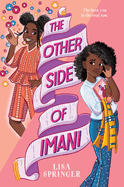
| Publisher: | HarperCollins | |
| Genre: | Humorous Stories, Adolescence & Coming of Age, Family, Social Themes, African American & Black, Juvenile Fiction, Siblings | |
| ISBN: | 9780063288782 | |
| Pub Date: | July 2025 | |
| Price: | $18.99 |
| Starred | Children's & Young Adult |
by Lisa Springer
Lisa Springer's second novel, The Other Side of Imani (after There's No Way I'd Die First), is an endearing stagger through new experiences as depicted by a Black tween who must stand up for herself and the truth.
Thirteen-year-old Imani's Barbadian father and Ghanian mother moved the entire family from California to Brooklyn, N.Y., so her dad could pursue his love of cooking Afro-Caribbean fare. Although Imani is nervous about going to a new school, she has "always dreamed about living in the Big Apple" because "it is the fashion capital of the world." So when she meets a fellow student who loves fashion and design as much as she does, she's thrilled. Popular girl Harlee is "a bona fide fashion industry insider" whose mother was a model and now works in the industry. Imani and Harlee bond over Imani's design ideas and sketches and are both delighted to enter a fashion competition with a scholarship to the prestigious Dekalb Art and Design High School as first prize. But Imani is accused of plagiarism when she hands in her work--her submission is evidently too similar to Harlee's. The other girl refuses to confess, and Imani cannot enter the competition as herself. What choice does Imani have other than to create another persona?
The Other Side of Imani is a gratifying novel that is broken up into invitingly short chapters with accessible language for middle-grade readers. Imani is a relatable protagonist, and her journey will likely resonate with readers navigating their own creative and sometimes difficult paths; a great read-alike for Renée Watson's middle-grade novels or Kelly Yang's Front Desk. --Natasha Harris, freelance reviewer

| Publisher: | Kokila | |
| Genre: | Asia, Fantasy, Romance, Young Adult Fiction, Historical | |
| ISBN: | 9798217002047 | |
| Pub Date: | July 2025 | |
| Price: | $21.99 |
| Children's & Young Adult |
by Julia Riew, Brad Riew
Two teens seek to free themselves from lives they detest in a tense and stirring YA historical fantasy based on the Korean War love story of sibling authors Julia and Brad Riew's grandparents.
The Dragon Empire rules unforgivingly over the Tiger Kingdom. Choi Eunji's wealthy Tiger family aids the Dragon Empire but she resents her "golden cage." Lee Seung, her family's servant, wants to help his starving Tiger family by mastering Dragon ki and attaining "the strength of ten normal men," but only the rich can afford the training. The teens make a deal: Eunji will help Seung pass the Exam for a prestigious ki school, and Seung will give Eunji freedom by sneaking her out of her house. The two fall for each other during a series of escapes, one in which they stumble upon a living tiger even though the Dragon Empire has declared them extinct after ceremonially slaying them all. After Seung fails the Exam while Eunji passes, the two become accidental enemies: Eunji must kill the very tiger Seung needs to free his people.
The Last Tiger is a suspenseful and compelling debut that features a malignant empire, the magic it buried, and the passionate few brave enough to rebel. Alternating first-person chapters, quotes from the Riews' grandfather, and intriguing side characters elevate and complicate the knot of duty and desire that Eunji and Seung must unfurl. There are mythic monsters, seamless side-by-side battles, heart-rattling rescues, and the love "of a boy and girl from opposite worlds." A gripping story with inspiring familial roots thatchampions the deeply human need for love. --Samantha Zaboski, freelance editor and reviewer

| Publisher: | Holiday House | |
| Genre: | Indigenous, Adolescence & Coming of Age, General, Social Themes, Juvenile Fiction, Historical, Native American | |
| ISBN: | 9780823458530 | |
| Pub Date: | July 2025 | |
| Price: | $17.99 |
| Children's & Young Adult |
by Anna Rose Johnson
Anna Rose Johnson's gentle, approachable middle-grade historical novel The Blossoming Summer explores the consequences of one teen believing her family's stability and happiness depends on her alone. When she learns that part of her father's "American" identity includes French Canadian Ojibwe, she adds to her emotional burden by trying to incorporate everything about her newly discovered identity into her British one.
It's 1940, and 13-year-old Rosemary's dream of an idyllic home seems impossible as the Second World War nears the U.K. and "her parents and brothers [are] scattered across England." When her family evacuates to the United States to live with the grandmother she's never met, Rosemary is certain she will be "the ideal older sister" and perfect daughter in a family that hasn't lived together for three years. But nothing can "perfectly" prepare her to handle a real, complicated world. After Rosemary's father begrudgingly tells his children about his cultural background, Rosemary works to bond with her intimidating grandmother by helping cultivate prize-winning produce; she also begins learning words, skills, and customs in her newly discovered culture, wanting to "understand about being Ojibwe" the same way she understands "all about being British."
Johnson (The Luminous Life of Lucy Landry), who is a member of the Sault Ste. Marie Tribe of Chippewa Indians, maintains a strong connection to her heritage in her writing, a straightforward style reminiscent of Natalie Babbitt's Tuck Everlasting and Jeanne Birdsall's Penderwicks series. Timeless themes of prejudice, identity, honesty, and letting go of control make this quiet, tender novel easy to relate to in any decade. A glossary of Anishinaabemowin (Ojibwe language) words is included. --Emilie Coulter, freelance writer and editor
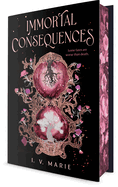
| Publisher: | Delacorte Press | |
| Genre: | Paranormal, Occult & Supernatural, Dark Fantasy, Fantasy, Romance, Young Adult Fiction, Paranormal | |
| ISBN: | 9780593898802 | |
| Pub Date: | July 2025 | |
| Price: | $21.99 |
| Children's & Young Adult |
by I.V. Marie
In Immortal Consequences, a compelling dark academia YA novel, six ambitious teens are stuck in a magic-infused world "parallel to life and death" where there is copious amounts of romantic tension, intrigue, and deception.
Wren, August, Emilio, Olivier, Irene, and Masika have all died, but none have "crossed over to the Other Side." Instead, they are at Blackwood Academy, a purgatorial magic school. Blackwood students generally "graduate" after a few hundred years--they lose "memories of their previous life" to the Forgetting and are sent to the Ether to "reap lost souls for the rest of their existence." Every decade, however, one outstanding student is nominated for the Decennial, a ritual that allows the student the option to join the academic elite or cross over. When the six teens sneak out to watch a new student arrive, they bear witness to a concerning--perhaps impossible--display of magic. Rather than getting in trouble, though, all six are ordered to participate in a startling revision of the Decennial: instead of celebrating one student, this year's Decennial is a competition. The six "unfortunate acquaintances" become immediate rivals, but there will still be only one winner--and all are determined it will be them.
I.V. Marie's well-crafted debut is a riveting page-turner with action, witty banter, mysterious secrets, and unfulfilled longing. Her agile prose describes an ensemble cast of competitive characters who are each driven to be the best, even as they remain haunted by mistakes of their past lives. The six strive to conquer fears, personality flaws, and errors in judgment, yet remain startlingly human: even dead, all are terrified of running out of time. --Lynn Becker, reviewer, blogger, and children's book author